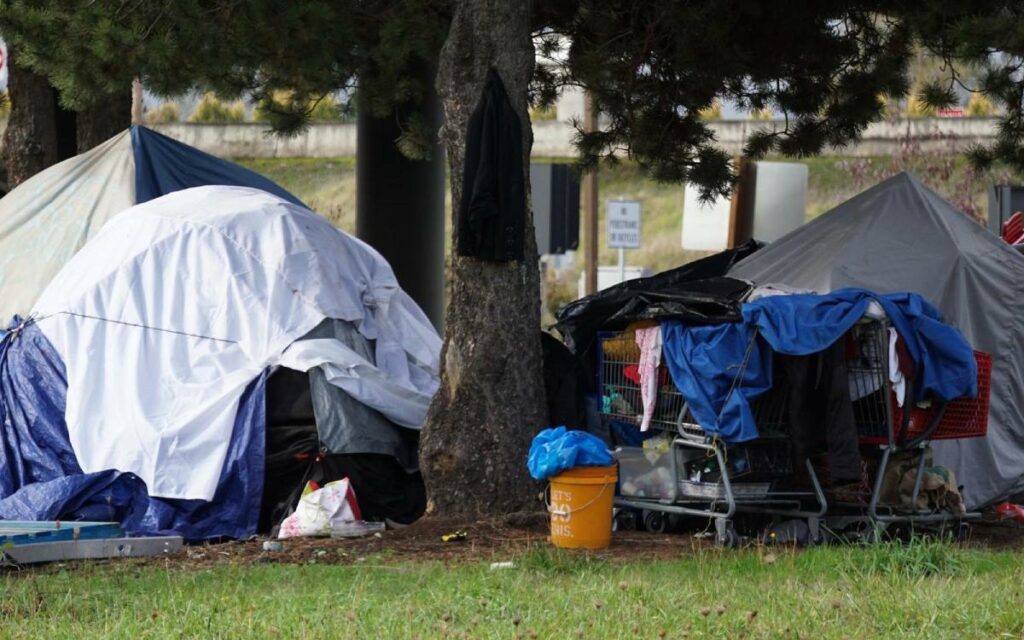
Council declared three states of emergency regarding homelessness, mental health, and opioid overdoses and poisoning back in April. The declarations are largely meant to send a message and get the attention of other levels of government. Photo credit: University of Toronto-Scarborough
Back at the beginning of April, Hamilton City Council voted to declare three separate states of emergency regarding homelessness, mental health, and opioid overdoses and poisoning.
The motion was brought forward by Upper Stoney Creek Councillor Brad Clark.
The move comes as councillors have also been in the midst of an ongoing debate regarding homeless encampments and whether to create sanctioned sites within the city.
The Hamilton Independent will be providing a more thorough update regarding the encampment debate in a future article.
As for the states of emergency, the motion passed unanimously on a 15-0 vote, with Councillor Esther Pauls absent.
Clark said that he was moved to bring forward the motion after visiting Hamilton shelters and learning that “families were being turned away.”
He said that upwards of 80 families in a month were turned away from shelters because there was no room. He also said that staff at shelters are struggling with the increased demands, resulting in high turnover and further issues.
“And the housing market as it stands with the insane rents that are being charged to people without the ability to pay is equally insane and it is putting more and more people on the streets,” he continued.
Clark also says that the opioid overdoses, which were originally somewhat limited to the downtown core are now “city-wide” in “significant numbers.”
Indeed, a city report noted that, as of February 2023, there were nearly 1,500 people experiencing homelessness in Hamilton.
Clark said that number is “unacceptable.”
The same report also noted that there were 26 opioid-related deaths in Hamilton in 2005 compared to 166 in 2021. Over 65 per cent of those deaths were among males between the ages of 25 and 65.
Hamilton paramedics responded to 814 suspected overdoses in 2022.
Additionally, the opioid-related death rate in Hamilton is 45 per cent greater than the provincial rate.
The multiple state of emergency declarations are largely meant to send a message and get the attention of other levels of government. The ultimate goal is increased funding from provincial and federal governments to address housing, the drug crisis, and mental health issues.
In speaking to the motion, Waterdown Councillor Ted McMeekin quoted the late Mississauga Mayor Hazel McCallion, saying, “There are three levels of government in this country, the feds who have all the money, the province who has all the power and the municipalities who have all the problems.”
“It’s time we suck it up and make the kinds of forceful statements we need to make,” McMeekin continued.
The motion also notes that the city has already invested millions of property tax dollars into programs, but the funding is “unsustainable.”
Despite that, Horwath said that homelessness, opioid deaths and mental health concerns are “fixable” through funding from other levels of government.
Horwath said that more “progressive taxation” is needed.
As part of Clark’s motion, the city will also be sending correspondence to the provincial government requesting action on eight measures.
Those measures include demanding the province expand consumption and treatment service sites and scale up “safe supply” options, create a task force to guide the development of a provincial opioid response plan, provide long-term funding to create more affordable and supportive housing, and increase investments in mental health initiatives.
Although Council did not give a dollar figure, they said that the province must provide “significant“ funding.
The city also wants the Ministry of Health to “immediately commit to fully funding gaps in mental health service as well as funding ongoing annual increases as required by inflation and population need.”
Hamilton’s emergency declaration follows a similar declaration from the Niagara Region that was passed in March. The City of Ottawa was the first in Canada to declare a homelessness emergency. Ottawa’s announcement was made in February 2020.

Based in Hamilton, he reaches hundreds of thousands of people monthly on Facebook, Instagram, TikTok, and Twitter. He has been published in The Hamilton Spectator, Stoney Creek News, and Bay Observer. He has also been a segment host with Cable 14 Hamilton. In 2017, he received the Chancellor Full Tuition Scholarship from the University of Ottawa (BA, 2022). He has also received the Governor General’s Academic Medal. He formerly worked in a non-partisan role on Parliament Hill in Ottawa.


















